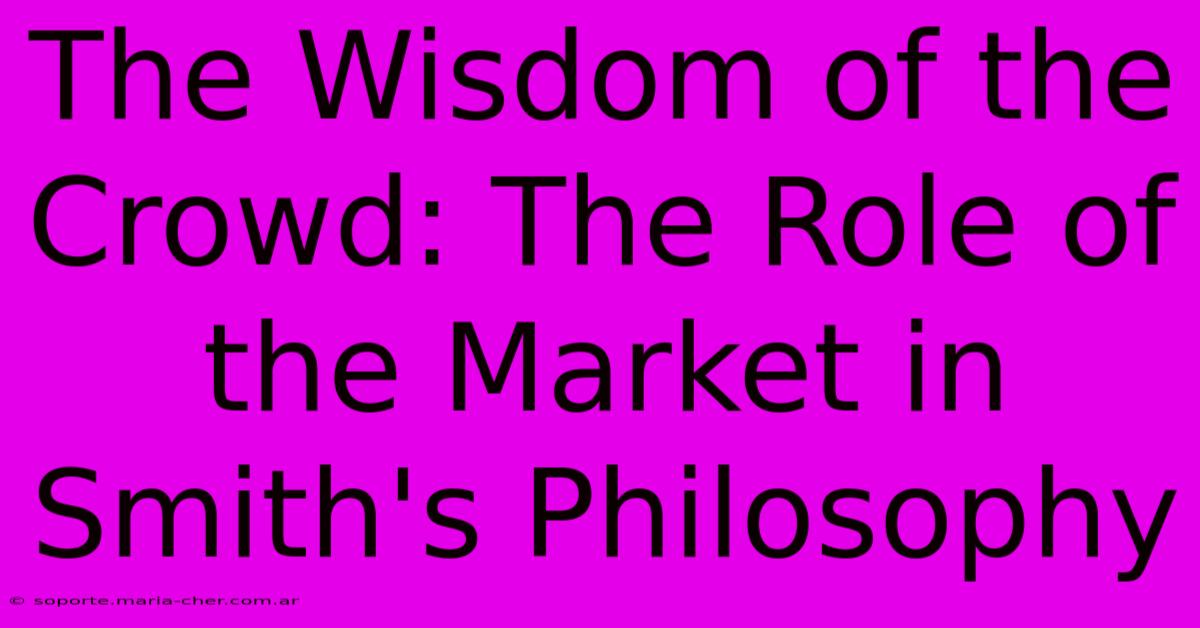The Wisdom Of The Crowd: The Role Of The Market In Smith's Philosophy

Table of Contents
The Wisdom of the Crowd: The Role of the Market in Smith's Philosophy
Adam Smith, the celebrated 18th-century economist, is often lauded as the father of modern economics. His magnum opus, The Wealth of Nations, laid the groundwork for numerous economic theories, but perhaps none is more enduring than his concept of the "invisible hand" and the inherent wisdom of the market. This essay will delve into Smith's philosophy, exploring the crucial role he attributed to the market mechanism in guiding economic activity and achieving societal prosperity.
Understanding the Invisible Hand
The "invisible hand" is not a literal hand, but a metaphor for the unintended social benefits resulting from individual actions in a free market. Smith argued that individuals, driven by self-interest, engage in economic activity that, surprisingly, benefits society as a whole. This seemingly paradoxical outcome arises from the competitive forces within the market. When individuals pursue their own gains, they are simultaneously compelled to produce goods and services that others desire. This competition keeps prices low, stimulates innovation, and leads to a more efficient allocation of resources.
The Mechanics of Market Coordination
The market, according to Smith, functions as a sophisticated coordinating mechanism. It doesn't require centralized planning or government intervention to guide resource allocation. Instead, it leverages the price system to convey information about supply and demand. High prices signal a scarcity of a particular good, prompting producers to increase supply. Conversely, low prices indicate an abundance, encouraging consumers to purchase more and potentially prompting producers to shift to other, more profitable ventures. This dynamic process, driven by the interplay of supply and demand, ensures that resources are directed towards their most valued uses.
Beyond Self-Interest: The Social Benefits of the Market
While self-interest is a driving force in Smith's model, he didn't advocate for a purely selfish society. He recognized the importance of morality and empathy, acknowledging that a functioning market relies on a certain level of trust and fair dealing. However, he believed that the market, even with its imperfections, outperforms alternative systems in generating wealth and improving the overall standard of living.
Competition as a Regulator
Smith emphasized the crucial role of competition in preventing exploitation and ensuring efficiency. A competitive market prevents any single entity from dominating and dictating prices. This competition pushes businesses to innovate, improve quality, and offer better value to consumers, ultimately benefiting society. The constant striving for improvement inherent in a competitive marketplace is a key element in Smith's vision of economic progress.
The Limitations of Smith's Model
It's crucial to acknowledge that Smith's model, while insightful, isn't without its limitations. His analysis primarily focused on a relatively simple economy with limited government intervention. Modern economies are far more complex, grappling with issues such as monopolies, information asymmetry, and externalities (like pollution) that Smith's model doesn't fully address. These complexities necessitate a more nuanced understanding of market dynamics and the potential role of government regulation in ensuring fair and efficient markets.
Addressing Modern Challenges
While the core principles of the invisible hand remain relevant, contemporary economists have expanded upon Smith's work to account for the complexities of modern economies. The understanding of market failures and the need for judicious government intervention to mitigate these failures is a crucial development in economic thought. This doesn't negate Smith's contributions but rather builds upon them, acknowledging the enduring value of his insights while addressing the limitations of his original framework.
Conclusion: The Enduring Relevance of Smith's Ideas
Despite the limitations, Adam Smith's insights into the market mechanism and the wisdom of the crowd remain highly relevant today. His emphasis on the power of self-interest channeled through competitive markets provides a powerful framework for understanding economic growth and prosperity. While modern economics has expanded and refined Smith's ideas, the core concept of the invisible hand continues to inform our understanding of how markets function and the crucial role they play in shaping our world. The principles of free markets, competition, and the inherent efficiency of the price system remain central tenets of economic policy debates worldwide, a testament to the enduring legacy of Adam Smith's profound insights.

Thank you for visiting our website wich cover about The Wisdom Of The Crowd: The Role Of The Market In Smith's Philosophy. We hope the information provided has been useful to you. Feel free to contact us if you have any questions or need further assistance. See you next time and dont miss to bookmark.
Featured Posts
-
Indulge In True Grandeur Explore The Captivating Interiors Of 6 Creeks Perry Homes
Feb 11, 2025
-
The Ultimate Guide To Ambiguous Bets A Step By Step Masterclass
Feb 11, 2025
-
The Invisible Force Behind Market Success Adam Smiths Revolutionary Insights
Feb 11, 2025
-
Reveal The Architectural Masterpiece Perry Homes In Santa Rita Ranch 50 Where Dreams Blossom
Feb 11, 2025
-
Escape The Hustle And Bustle At Perry Homes Fulbrook Find Your Tranquil Haven
Feb 11, 2025
